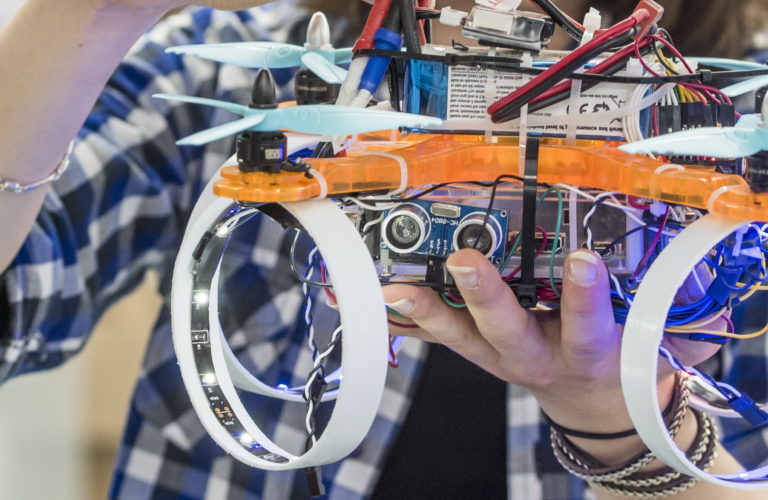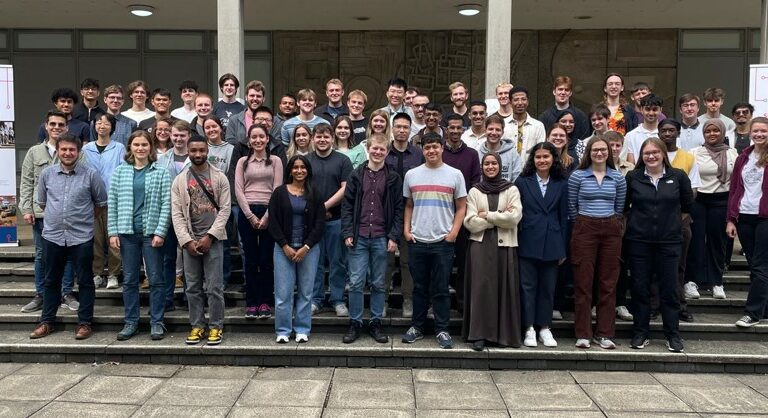The UKESF Renesas Award for Female Students is a fantastic opportunity to gain valuable work experience, during a paid summer placement, and receive a financial bursary whilst an undergraduate at university. The award, a collaboration between Renesas (formerly Dialog) and the UKESF, supports female students at the start of their Electronics-related degree course, at one of the UKESF’s 28 partner universities.
2022/2023 award winners Arkapriya and Tianya – both University of Cambridge students – have just finished their summer work placements at Renesas and in this blog we hear about their motivations, how the award has benefitted them and advice for other women considering a career in Electronics.
Arkapriya
My three passions in secondary school were definitely mathematics, physics and computer science – something I carried forward with me to A Levels and now at University. Electronic engineering is the natural intersection of these disciplines – bringing the nuance of physics to understand physically what is going on in a device, the logic of computer science in digital electronics, and the mathematics that underlies all of it. My interest continues to evolve with my experience at Renesas – for instance, I have developed an appreciation for analogue design and semiconductor physics.
The UKESF Renesas Award has served me in many ways, bolstering my academic, professional and personal growth
It taught me the calibre of skills needed to be a proficient engineer; gave me an opportunity to further my understanding of the industry; and taught me how to most effectively use my time. Learning from textbooks will only go so far – poring over all the practice questions and theory is incomplete without the learning and appreciation derived from practical experimentation, as I’ve been doing for the past few weeks. Unfortunately, hands on experience like this tends to be a luxury when hard pressed for time – which is why I’m very grateful for this placement for giving me that space and time to improve my understanding.
In addition, it is a privilege to witness the research and development that takes place at such organisations – I have seen and handled (with guidance) equipment and facilities that are state-of-the-art. I have also had the honour of meeting incredibly intelligent engineers who are always willing to teach. Having exposure to such an environment opens up so many different possibilities in your mind young person, and working under such mentors not only accelerates your learning, it also provides you with role models.
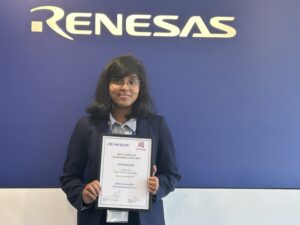
I’ve known I wanted to study engineering since I was about fourteen years old – at the time it was clear to me I enjoyed the physical sciences a lot, and I enjoyed creative work when building prototypes for technical projects. I streamlined my focus to engineering subjects in each stage of my journey, and now I am studying it at the University of Cambridge, working to earn a Masters degree by 2026.
My biggest takeaway is how complicated the entire process is and how much work goes into creating a single product. Everyone I have met is constantly using a range of their skills to tackle each problem that arises. Starting university, it is very easy to be overwhelmed by the level of proficiency one has to reach: I remember finding electronic engineering, particularly analogue analysis and design very challenging – it did not come naturally to me. But, working under the wing of so many seasoned engineers at Renesas gave me the freedom to explore the topic and gain confidence in it. I was encouraged to take my understanding further, and found it immensely rewarding to grasp new concepts.
Female students need to be given the opportunities to recognise our skills and improve our self-assurance
I found that more than anything, my lack of confidence was the greatest barrier in pursuing my goals. From my own experiences, I had many opportunities in secondary school and sixth form to prove to myself I had the ability and drive to turn my passion into a career. That is the most important thing, in my opinion – the exposure to STEM and active engagement in it. Being given opportunities like this award affirms that decision.
If I were to give advice to other female students considering a career in engineering it would be “Go for it!”. There tend to be fewer female engineers than male engineers – do not let that be a deterrence. At the end of the day, we are all people with brains. If you cultivate your interest and continuously improve your technical skills, it is a very rewarding path. There is no greater feeling of achievement than seeing the fruits of your labour, and Electronic Engineering is certainly a career where you see it happen. I believe that if you strongly want this, the only barrier between you and your goal should be your competence.
Tianya
Electronics has always been a field that combines problem-solving and innovation with the tangible world around us. For me, electronics are everywhere, from daily devices that we use like phones and smartwatches to advanced technologies like robots and automotive. I enjoy the potential for creativity and learning when solving electronics problem. There’s always something new to discover, whether it’s designing a circuit, programming a microcontroller, or exploring the latest advancements in semiconductor technology. The feeling of bringing an idea to life through electronics is incredibly rewarding, and it’s a field that continuously challenges and inspires me.
The UKESF Renesas Award has opened a multitude of doors for me to delve deeper into the fascinating realm of semiconductors
The placement opportunity transcends textbooks and theory, offering me the exhilarating opportunity to witness real-world applications come to life. It’s like the missing piece of the puzzle finally falling into place, where everything clicks with a profound sense of excitement.
My journey in electronics has been a thrilling exploration, with Arduino robots being a significant part of it. Working with microcontrollers has been particularly fascinating. These pint-sized devices, akin to miniature computers, never cease to amaze me with their ability to accomplish a wide array of tasks through programming. From designing a personalised gardening system that automates plant care to creating a drawing robot capable of intricate artworks, each project deepened my passion for electronics.
During my journey at Renesas, I’ve gained a fundamental understanding of how microchips function
I had the opportunity to delve into HTOL testing, which provided insights into the rigorous process of testing electronics for reliability. While working in the software team, I’ve had the opportunity to provide support to hardware engineers in test simulations. Witnessing how graphical user interfaces are employed to automate testing processes has been particularly fascinating. Looking ahead, I want to delve into the cutting-edge world of chip design, where I hope to explore ways to enhance semiconductors’ reliability and expand their capabilities.
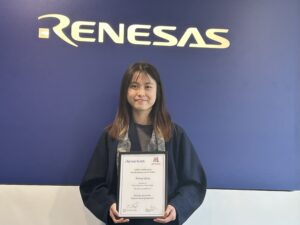
Promoting gender diversity and inclusion in the electronics profession is essential. By creating an inclusive environment, women will be encouraged to pursue careers in electronics. The industry should invest in training and development programmes that empower women to enhance their technical skills and overall confidence in their roles. It would be good to encourage the formation of women’s support networks within the industry, allowing women to share experiences, exchange insights, and provide mutual support.
First of all, have confidence in your abilities and potential. Believe that women can equally excel in the field of Electronics. It is also important to embrace failures as valuable learning experiences. Electronics often involves trial and error but it always bring you closer to finding the right solution. Keeping up with industry trends, emerging technologies, and new developments in Electronics would also be helpful. But just enjoy!
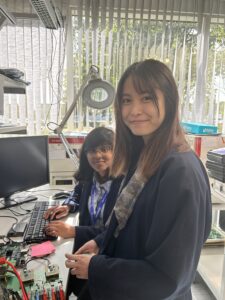
Find out more about the UKESF Renesas Award here
